- Home
- Jonathan Stroud
The Ring of Solomon Page 14
The Ring of Solomon Read online
Page 14
I shrugged. ‘A survivor.’
‘Any others about?’
We surveyed the forlorn wreckage of the camel train, scattered about the gorge. All was silent, all was still, apart from a couple of riderless camels wandering in the distance, and some vultures circling lazily. No other survivors met the eye.
Someone else I couldn’t see was the fugitive Edomite magician. It struck me suddenly that he would be useful to bring back to Jerusalem alive. Solomon would be interested in hearing at first hand the reasons for the bandits’ activities …
The girl (who still hadn’t thanked us) was sitting on her couch, regarding Faquarl and me with her big dark eyes. I addressed her curtly. ‘I’m looking for one of the bandits who attacked your party. Came springing down the rock-face here. You must have seen him. Mind telling me which way he went – if it isn’t too much trouble?’
With a languid gesture, the girl indicated a large granite boulder on the opposite side of the road. Two feet projected from behind it. I hurried over, to discover the Edomite lying there, a silver-bladed dagger protruding neatly from the centre of his forehead. The silver’s aura made me nauseous; nevertheless, I shook him anxiously, in case he was just dazed. It was no good. Bang went the live witness I was hoping to take back to Solomon.
I looked towards the girl, hands on hips. ‘Did you do this?’
‘I am a priestess of the Temple of the Sun in blessed Himyar. That man’s demons destroyed my fellow travellers. Should I have let him live?’
‘Well, a little bit longer would have been nice. Solomon would have wanted to meet him.’ Annoyed as I was, I looked at the girl with a certain grudging respect. Priestess of the Sun or not, skewering a moving target without getting off her camel wasn’t bad going, though I had no intention of admitting it.
Faquarl had been regarding the girl as well, in a rather thoughtful manner. He nodded in her direction. ‘Where did she say she was from?’
The girl overheard; she spoke in ringing tones. ‘I say again, O demons, that I am a priestess of the Sun and representative of—’
‘She’s from Himyar.’
‘Where’s that?’
‘Arabia someplace.’
‘– the Great and Royal House of Himyar! I speak for the queen and all her people, and we demand—’
‘I see …’ Faquarl beckoned me aside. We moved off a little way. ‘I’ve been thinking,’ he said softly. ‘If she’s not an Israelite, then she’s not covered by the protective clauses, is she?’1
I rubbed my beardy chin. ‘True …’
‘And she’s not set foot in Jerusalem, either.’
‘No.’
‘Plus she’s young, she’s appetizing—’
‘Demons! I demand a word!’
‘Very appetizing,’ I agreed. ‘Good set of lungs on her too.’
‘And since, Bartimaeus, since we’re both a little jaded after all our hard work—’
‘Demons! Attend to me!’
‘Since we’re both, I might go so far as to say, a little peckish—’
‘Demons—’
‘Hold on a minute, Faquarl …’ I turned to address the Arabian girl. ‘Would you mind not using that word?’ I called. ‘“Demon” is an extremely pejorative term.2 It offends me. The correct way to address either of us would be something along the lines of “Revered djinni” or “Masterful spirit”. All right? Thank you.’
The girl’s eyes opened wide, but she said nothing. Which was a relief.
‘Sorry, Faquarl. Where were we?’
‘We were both a little peckish, Bartimaeus. So, what do you say? No one’s going to know, are they? Then we can fly back to our master and bask in our triumph. We’ll all be on Temple Mount by nightfall, sitting cosily around the fire. Meanwhile Khaba will be restored to Solomon’s good graces, and he’ll call off that shadow of his and save your sorry skin. How’s that sound to you?’
It didn’t sound at all bad, particularly the bit about the shadow. ‘All right,’ I said. ‘Bagsy her haunches.’
‘Now that’s not fair. Who killed more utukku today?’
‘You can have the pick of the rest of her. And I’ll throw in the camel too.’
Bickering pleasantly, we turned back towards the girl, to discover her looking down upon us from on high with an expression so thunderous that even Faquarl flinched. She had pulled her shawl back from her head, so that her hair fell loose about her slender neck. Her face was fearsomely serene. Her slim arms were tightly folded, her fingers tapped pointedly upon her sleeve. Slight as she was, with badly singed clothes and dishevelled hair, sitting as she undoubtedly was upon an ugly camel beneath a sagging canopy, she still had enough force of personality to bring us both up short.
‘Exalted spirits,’ she said, in a voice of iron, ‘I thank you both for your intervention in this present disaster. Without your timely aid I would most certainly have perished, like these unfortunate merchants who were my recent companions. May their souls ascend most speedily to the Sun God’s realm, for they were peaceful men! But now hear my words. I am an envoy and sole representative of Himyar’s queen, travelling in haste to Jerusalem to speak with Solomon of Israel. My mission is of paramount importance. Great matters hinge upon its success. I therefore dema— I request that you assist me, that I may complete my journey at best speed. Aid me in this, and I shall come before your masters, whoever they may be, asking that they free you from your present servitude and send you back to the great abyss3 from whence you came.’ She raised a hand towards the sky. ‘Before the Sun God and the sacred memory of my mother, this I hereby vow!’
There was a resounding silence. Faquarl rubbed his hands together. ‘Right,’ he said. ‘Let’s eat her.’
I hesitated. ‘Hold on – didn’t you hear what she said about winning us our freedom?’
‘Don’t believe a word of it, Bartimaeus. She’s human. She’s a liar.’
‘She’s human, yes … but she’s got something about her, don’t you think? Reminds me a bit of Nefertiti.’4
‘Never met her,’ Faquarl sniffed. ‘I was in Mycenae then, if you recall. Anyhow, who cares? I’m hungry.’
‘Well, I think we should wait,’ I said. ‘She could intercede with Khaba—’
‘He’s not going to listen to her, is he?’
‘Or Solomon, maybe …’
‘Oh, right. Like she’s going to get anywhere near him.’
This was all probably true enough, but I was still irritated with Faquarl for his comments earlier that afternoon, and that made me stubborn. ‘Another thing,’ I said. ‘She’ll be a witness to our fight.’
Faquarl paused, but shook his head. ‘We don’t need a witness. We’ve got bodies.’
‘She called us “exalted spirits” …’
‘Like that makes any difference!’ Faquarl gave an impatient growl and made a side-step in the girl’s direction, but I moved slightly to block his way. He pulled up short, eyes bulging, tendons flexing in his jaw. ‘This has always been your trouble!’ he snarled. ‘Getting all soft-headed over a human just because she’s got a long neck and a steely eye!’
‘Me? Soft-headed? I’d eat her soon as look at her! But she might be able to help us, that’s my point. Your problem is you can’t control your appetites, Faquarl! You’d eat anything that moves – girls, stench-mites, mortuary imps, the lot.’
‘I’ve never eaten a mortuary imp.’5
‘I bet you have.’
Faquarl took a deep breath. ‘Are you going to let me kill her?’
‘No.’
He threw his hands up in disgust. ‘You ought to be ashamed of yourself! We’re slaves, remember – slaves of humans like that girl there. Will they ever do us a good turn? No! Building sites and battlefields6 – that’s all they’ve wanted us for, ever since Ur. And it’ll never end, Bartimaeus, you know that, don’t you? It’s a war between us and them – and I mean all of them, not just the magicians. All those dough-brained farmers, their clasping wives, the
ir snotty, squalling children – they’re just as bad as Khaba and the rest. This girl’s no different! They’d happily cast us into the Dismal Flame without a thought, if they didn’t always want new walls built, fields dug, or need some other tribe of brainless humans killed!’
‘I don’t deny any of that,’ I cried. ‘But we’ve got to be practical about chances that come our way. And this is a chance. You don’t want to go back to the quarry any more than I do, and it’s just possible that this girl might— Oh, now where are you flouncing off to?’
Like an irritable toddler,7 Faquarl had spun round and marched away. ‘You like her so much,’ he called, ‘you stay with her. You keep her safe. I’m off to fetch Khaba, and we’ll see if she can magic us up our freedom. Maybe you’ll be proved right, Bartimaeus. Or just maybe you’ll come to regret not feasting on her while you can!’ So saying, he spun a cloak of scarlet flame about his wings and sprang into the sky, and with a final oath that caused small avalanches to tumble down the lonely gulleys, rose up to meet the sun.
I turned to stare at the silent girl.
‘Well,’ I said. ‘It’s just you and me now.’
1 At Solomon’s behest every summons in Jerusalem, made by no matter which magician, included within it certain strict clauses forbidding us to harm the local population. This wasn’t anything new in principle – all the old city states of Mesopotamia had used similar injunctions – but they’d been confined to citizens by birth, so there was always the possibility of snacking on a visiting trader, slave or captive on the side. Solomon, in his wisdom, had expanded the clauses to include anyone who set foot within the city walls, which made for an admirably inclusive municipal environment, and also a good number of grumpy, hungry djinn.
2Demon: the actual term used at this juncture was in fact the Old Akkadian word rbisu, which in its origin simply means ‘supernatural being’. But as with the Greek daimon (still several centuries in the future), it was all too often employed as an abusive generality, as likely to refer to a pimple-bottomed imp as to a debonair djinni-about-town.
3Great abyss: not the most accurate or flattering description of the Other Place that I’ve ever heard, but a very common misconception. In fact our home is nothing like an abyss, having no ‘depth’ to speak of (nor any other dimensions), and not being at all dark either. It’s just like humans to impose their own imagined terrors upon us, when in fact all true horrors are found in your world.
4Nefertiti: principal wife of the pharaoh Akhenaten, 1340s BC. Started out bringing up the children, ended up running the empire. Looked damn good in a headdress too. Let’s just say you didn’t mess with her.
5Mortuary imps: small, pudgy, white-skinned spirits employed by the priests of Egypt to help them mummify the bodies of the great and good. Specializing in all the icky bits of the process, such as brain removal and filling up the canopic jars, they tasted abominably of embalming fluid. So I’ve been told.
6Building sites and battlefields: sometimes, indeed, we were forced to hop between one and the other at a moment’s notice, which could be inconvenient. I once fought three ghuls single-handed in a sudden skirmish at the gates of Uruk. They wielded spiked maces, flaming spears and double-headed silver battle-axes. Me? I had a trowel.
7 Only bigger, brawnier and more blood-stained.
17
‘Well,’ the demon said. ‘It’s just you and me now.’
Asmira sat rigid in her saddle, feeling the sweat trickling down the back of her neck. Her heart was pounding so hard against her ribs she felt sure the demon must see it, or at least notice the trembling of her hands, which she had placed in her lap for that very reason. Never let them see your fear – that was what the guard-mothers had taught her; let your foes think you nerveless, resolute, impossible to daunt or threaten. She did her best to keep her face impassive and hold her breathing as steady as she could. With her head coolly turned aside, she kept her eyes trained on the creature’s every movement. Her fingertips rested on the dagger hidden beneath her robes.
She had seen a glimpse of its power when it had destroyed another of its kind with a blast of explosive fire, and she knew that, if it chose, it could easily kill her too. Like the monsters that had attacked her in the gorge, it was clearly far more dangerous than the spirits she had summoned during her training or the petty demons of the hill-tribes. It was probably an afrit of some kind; perhaps even a marid. Silver was her best defence now; her Wards might irritate it, but would do little more.
Not that the demon wasn’t irritated already. It glanced up into the sky, where its companion had become a fiery dot on the horizon, and uttered a soft curse. With its sandalled foot it kicked a stone far off across the gorge.
Asmira knew well enough that higher spirits could adopt any shape they chose, the better to beguile or dominate those around them. She also knew how foolish it was to take heed of how they looked. Yet this one gave her pause. Unlike the horrors that had attacked the caravan, unlike its own companion – which had seemed to delight in exuding a swaggering ferocity – this spirit concealed its wickedness beneath a pleasant form.
When it had first tumbled into view, it had been a bearded traveller, badly stained with marks of battle. At some point since (and she had not noticed exactly when the change occurred) it had subtly transformed into a young, fair-featured youth, with dimpled cheeks and merry eyes. Its hair fell in curled black ringlets about its brow, and its limbs were hale and strong. Something of its cast of face and skin reminded Asmira of the men of Babylon who visited the Sheban court, but the style of its clothes was simpler than theirs – just a plain, wrapped knee-length skirt, and necklaces of amethyst upon its naked chest. On its back was a pair of white wings, neatly folded and very magnificent. The largest feathers were longer than her forearms. On the edge of the left-hand wing a soft gelatinous substance hung limp and raw, glistening coldly in the afternoon light. Other than this imperfection, the guise was very beautiful.
Asmira watched the winged youth, her heart thumping in her breast. Suddenly it turned its head, and its eyes met hers. She looked away, and immediately felt furious with herself for doing so.
‘I hope you can deliver on your promise, O Priestess of Himyar,’ the youth said. ‘I’ve put my essence on the line for you.’
Asmira had not understood the argument between the demons, which had been conducted only partly in Arabic, and partly in languages that were unknown to her. Forcing herself to meet the dark, cool gaze, she kept her voice as imperious as before. ‘Where has it gone?’ she said. ‘The other demon? And what of my request?’
The youth raised a languid eyebrow. ‘Dear me. That naughty word again.’
It stepped suddenly towards the camel. In a flash of movement, Asmira’s silver-bladed dagger was out of her belt and balanced in her hand.
The youth stopped short. ‘Another knife? How many have you got in there?’
Asmira had lost one dagger during the chaos of the battle, and had left another in the Edomite. She had two more in her leather bag. She said haughtily, ‘That is none of your concern, demon. I asked you—’
‘And I asked,’ the creature said, ‘if you’d refrain from using bad language in my company. Whipping daggers from your knickers isn’t wildly polite either.’ It laid a dark hand upon her camel’s flank and patted it gently. ‘How about you put the thing away? I can feel the silver’s chill from here, particularly in this wing of mine. This wing that I wounded just now,’ it added pointedly, ‘in defence of you.’
Asmira hesitated, numb with indecision, panic roiling in her stomach. Stiffly, she lifted her cloak and tucked the dagger back into her belt.
‘That’s better,’ the demon said. ‘Oh, and you’ve a silver disc dangling about your neck … Mind tucking that away too?’
Asmira did so. The winged youth said no more. Giving the camel a final pat, it walked a few yards off and stood surveying the gorge. After a while it began whistling the notes of a rhythmic dervish song.
&n
bsp; Anger at her own compliance, and at the demon’s cheery indifference to her questions, almost made Asmira retrieve the dagger and throw it at its back. But she kept her face calm, and forced the fury down. The creature was associated with Solomon, and might yet be of use to her. Any chance of getting swiftly to Jerusalem must be pursued.
Besides, it was true what it said – it had come to her aid.
‘You must forgive my caution, O spirit,’ she called. ‘Without my defences I would be dead. Please understand I keep them ready at my side.’
The young man glanced over; the keen dark eyes appraised her. ‘Helped ward off the utukku, did they? I was wondering how you survived.’
‘Yes,’ she said. ‘My dagger saved me. A lizard dem— a lizard spirit, I mean – leaped at me, but I slashed out at it, and the silver took it by surprise. It jumped back, and was about to attack again, when it suddenly got distracted and disappeared.’
The winged youth chuckled. ‘Ah yes, that would have been me arriving. Perhaps you saw the blind panic on its face?’
In Asmira’s experience demons were not very intelligent. This one’s self-satisfaction was so evident that she sought to take advantage. ‘I did indeed!’ she said quickly. ‘And I can only apologize that I did not thank you the instant you arrived. I was still distressed by the assault, and did not realize I was speaking with one of the great ones of the air. May the Sun God chastize me that I was blind to your radiance! But I perceive it now. I say again that you have delivered me most nobly from death and I am for ever in your debt! I thank you humbly from the bottom of my unworthy heart.’
The young man gazed at her and raised one eyebrow in an ironic fashion. ‘Do they always speak like this in Himyar?’
‘Usually we are less emotional and employ a more formally complex sentence structure.’

 The Leap
The Leap Buried Fire
Buried Fire Heroes of the Valley
Heroes of the Valley The Empty Grave
The Empty Grave The Hollow Boy
The Hollow Boy The Last Siege
The Last Siege The Dagger in the Desk
The Dagger in the Desk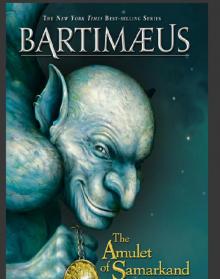 The Amulet of Samarkand
The Amulet of Samarkand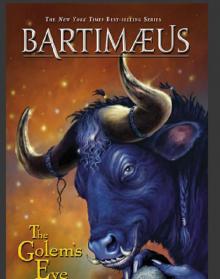 The Golem's Eye
The Golem's Eye The Screaming Staircase
The Screaming Staircase The Outlaws Scarlett and Browne
The Outlaws Scarlett and Browne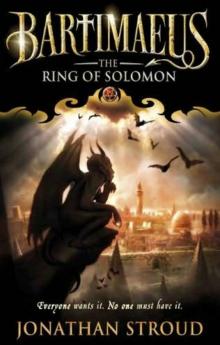 The Ring of Solomon: A Bartimaeus Novel
The Ring of Solomon: A Bartimaeus Novel Lockwood & Co
Lockwood & Co Lockwood & Co: The Screaming Staircase
Lockwood & Co: The Screaming Staircase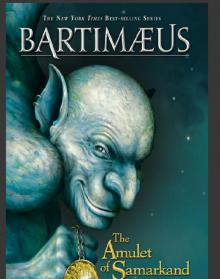 Bartimaeus: The Amulet of Samarkand
Bartimaeus: The Amulet of Samarkand The Amulet of Samarkand tbt-1
The Amulet of Samarkand tbt-1 Lockwood & Co.: The Creeping Shadow
Lockwood & Co.: The Creeping Shadow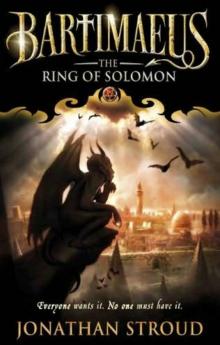 The Ring of Solomon
The Ring of Solomon Lockwood & Co. Book Three: The Hollow Boy
Lockwood & Co. Book Three: The Hollow Boy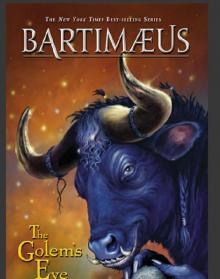 Bartimaeus: The Golem’s Eye
Bartimaeus: The Golem’s Eye